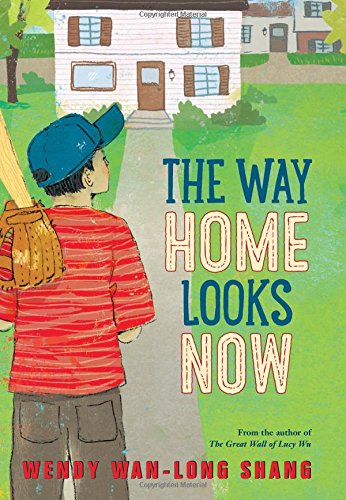[alert variation=”alert-info”]Publisher: Scholastic Press
Formats: Hardcover, Paperback, Kindle
Purchase: Powell’s | Amazon | IndieBound | Barnes & Noble | iBooks[/alert]
Peter Lee and his family have just been through a shocking tragedy: the sudden death of his older brother, Nelson. While dealing with his own sense of loss, Peter must also grieve the “loss” of his mother to her catatonic depression after Nelson’s death; she has stopped taking care of the family and sits on the couch day in and day out in a state of shock. Then, Peter tries out for Little League baseball, hoping that following along with his games will give his mother, also a baseball fan, something to be excited about again. But when his father volunteers to be a coach, and his strict coaching method doesn’t exactly make him popular among Peter’s teammates, Peter wonders if this was a good idea after all.
This story is an honest look at the way a loss of a loved one can affect the entire family. When Peter talks about Nelson’s death, or his mother’s depression, it is in the way an adolescent boy would really discuss such things, not an adult author projecting the moral of the story onto a young character. The novel is a beautiful portrait of how young people deal with, and hopefully overcome, tragic circumstances – but it is not heavy-handed or gloomy about it. The author is able to get into a young child’s mind with great ease and conviction.
Later in the book, when other big issues come up – the Vietnam War, whether boys and girls should have equal opportunities in sports, a bullying teammate with a difficult home life – the author doesn’t slip into the preachy tone that many young adult novels often take with such issues. Later in the novel, when Peter’s baseball team must stand up against prejudice a fellow teammate is facing, it is a moving scene (although maybe a bit unrealistic, given the book’s 1960s time period).
The novel doesn’t wrap up in with a tidy, pat ending, where everything is okay again, Peter’s team wins it all, and his mother is magically happy again. Nor does it end on a grim note—and indeed, despite the book’s treatment of difficult issues, it’s not a depressing book at all, and has a lot of laughter and hope. It ends in a realistic way, where some problems may have been resolved but some are still being worked on, just like in life. It’s a great lesson to young readers that grief may not go away, even for a long while, but that with the passage of time and support of friends, it can get easier to bear.
The Way Home Looks Now seems destined to be studied in late elementary and middle school English classes for years to come. Its nuanced portrayal of real characters and real feelings gives readers much to study, and much to think about, even after they have put the book down.
[signoff predefined=”Social Media Reminder” icon=”facebook”][/signoff]

